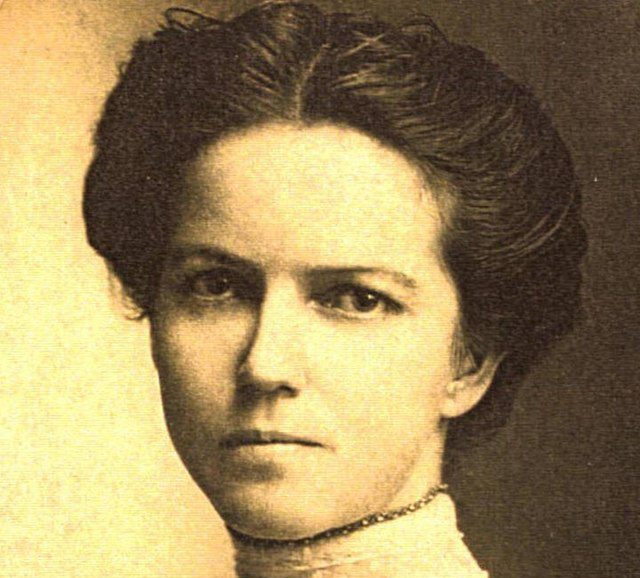
Beyond her writing, Dix advocated for women’s suffrage and pushed for passage of the Nineteenth Amendment to the U.S. Constitution.
Mississippi claims as her own the highest paid and most widely read female journalist of the twentieth century’s first half, but even then, few knew her real identity. Early female writers often used false names to avoid possible embarrassment or poor social standing, to free themselves of cultural constraints.
Elizabeth Meriwether Gilmer, born in 1861 on a plantation bordering Montgomery County, Tennessee, and Todd County, Kentucky, solidified her Mississippi connection when she bought a cottage on Beach Boulevard in Pass Christian in 1929. Well established by then as both a writer and women’s activist, she became America’s highest paid and most widely read female journalist by the time of her death at age 90 in 1951.
Gilmer’s journalistic career had begun on the other side of the Bay, when for a family vacation her father rented a place in Bay St. Louis next door to the poet “Pearl Rivers,” then owner of the New Orleans Picayune, who had chosen her pseudonym to recognize the river flowing near her childhood home in Hancock County, Mississippi. The poet, Eliza Jane Poitevant Holbrook Nicholson, saw Gilmer’s writing and gave her a job as a reporter.
The emerging newspaper woman chose Dorothy Dix as her pen name. She liked the name Dorothy and honored with Dix the name of Mr. Dick, a slave who had saved the Meriwether family silver during the Civil War.
When Dorothy Dix published her first advice column in 1895, she had been married seven years to her stepmother’s brother. Soon into the marriage, she realized George Gilmer lacked mental and financial stability but remained married until his death in an asylum in 1931.
Obituaries, recipes, and theater reviews comprised early writings. Her domestic advice column, “Dorothy Dix Talks,” gained widespread notice from 1923, when she signed with the Philadelphia-based Public Ledger Syndicate. Published in some 273 papers, the column gained an estimated sixty million readers and became the world’s longest-running newspaper feature. Her ten-point plan for happiness, “Dictates for a Happy Life,” remains popular for the writer and author of such books as How to Win and Hold a Husband and Every-Day Help for Every-Day People.
Dix also drew readers for her reporting of murder trials. As leading crime reporter for William Randolph Hearst’s New York Evening Journal, covering mostly murders and trials, she focused on human interest and used sentimental language, earning her the reputation of a sob sister.
Beyond her writing, Dix advocated for women’s suffrage and pushed for passage of the Nineteenth Amendment to the Constitution of the United States. The amendment, which prohibits any state in the USA from denying the right to vote to citizens of the United States on the basis of sex, was introduced in Congress in 1878 and finally passed in the House and the Senate in 1919 before its certification in 1920. Mississippi lawmakers strongly opposed the Nineteenth Amendment, voting twice in 1920 to reject the notion, but on March 22, 1984, became the last of the states existing in the nation in 1920 to ratify the law.
As an activist journalist, Gilmer/Dix celebrated women. In one column, she proclaimed, “Women who are toiling over cooking-stoves, slaving at sewing-machines, pinching and economizing to educate and cultivate their children … the Ordinary Woman is the real heroine of life.” While she encouraged women to work outside the home, she lauded “the domestic woman—the woman who is the mainstay of the world, who is back of every great enterprise and who makes possible the achievements of men—the woman behind the broom, who is the hardest-worked and worst-paid laborer on the face of the earth.”
In columns and speeches, she asserted that “every question of politics affects the home, and particularly affects the woman in the home.” Originally published in 1908 in the San Francisco Examiner, one of her pieces described the differences between men and women, household budgets, morals, and education.
After her death, and in his 1955 version of the song, “Make Yourself Comfortable,” Andy Griffith told the story of a man writing to Dix for her advice on the aggressive woman he was dating. An episode in the sitcom The Honeymooners referenced her when Ralph Kramden exclaimed, “Okay, Dorothy Dix, fixer of marriage problems, fix my sleeping problem!”
One biographical note shows Gilmer/Dix working in her Pass Christian garden, filled with lemon and orange trees. Her estate then was estimated to be worth nearly two-and-a-half million dollars.











